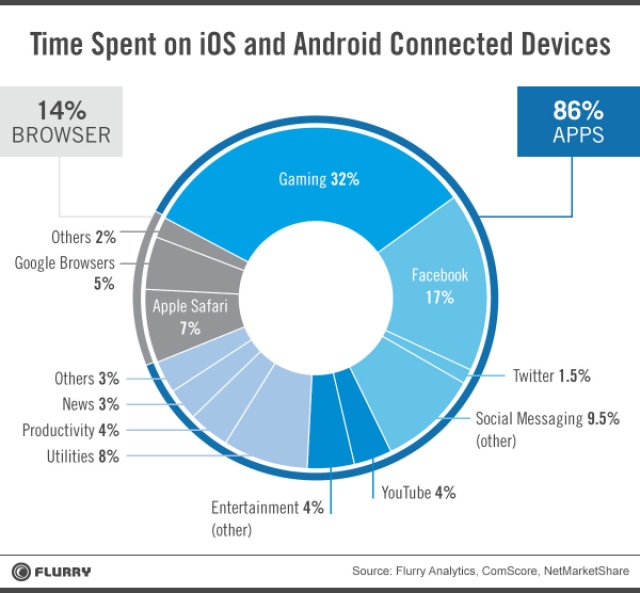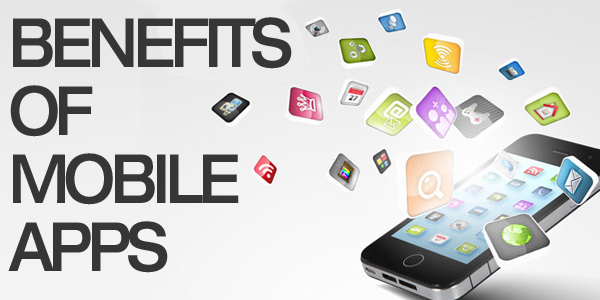“In the 1990s the internet emerged as a public communications medium, and there were countless commentaries on its social impacts and implications. It took a series of transformations over the course of the 1980s and early 1990s to turn the internet into a popular form of communication” (Abbate, 1999, 181).
Mobile Apps: Then and Now
Now here we are over 27 years later with the internet becoming an ever important need in our daily lives. The access to the internet went from just computers to tablets, television, and so on with the most convenient being smartphones. In this day and age, one thing that we all consider an essential part of our lives is our smartphones. Our smartphones allow us to stay in touch with others through text and call, browse the web, and keep track of our location while in new places and identifying where we are. “The most profound technologies are those that disappear. They weave themselves into the fabric of our everyday life until they are indistinguishable from it” (Weiser, 1991, 94). Our smartphones with these mobile apps have become such an important aspect just to function in our daily lives. The apps that we don’t realize we use daily that save us from having to memorize important things. Apps such as: Notes, Contacts, Maps, and work related ones. Mobile applications can improve ones’ work productivity, relationships with family and friends, and overall quality of life.

Mobile Apps: Personalized Just How We Like It
Our smartphones are almost as if to be a necessity that we don’t do too many things in the day without them. It has become a part of our daily lives as if just “weaving” itself right in as Weiser stated and without it some of us would be lost. We have made the apps so personal into our lives that we like to be able to personalize them as well. “Personalization is about offering tailored communication to users based on their interests, location, usage behavior and more” (Deshdeep, 2015). The mobile apps allow us to set up our own preferences and observe the engagements made with the app, it helps make the experience with the app much better since it is set up the way we want it to be. The ease in notifications are a kicker too so that you are able to receive notifications outside of the app as well. These are known as “push” notifications that instantly come to the phone. There are no restrictions on what you can do with a mobile application and they perform actions much quicker than a mobile website. “Mobile users spend 86% of their time on mobile apps and just 14% of the time on mobile websites” (Deshdeep, 2015).
Mobile Apps: Work Life
We can do just about anything on our phones, but what makes these smartphones so useful are the apps installed on them. Many people have multiple apps installed on their phone, myself included, which assist in some way to our daily tasks. “While often cross-cultural research focuses on differences between cultures, some comparative mobile communication studies suggest that there may be more similarities than differences in the ways people use and appropriate mobile communication technology (Humphreys, et. al., 2013, 493). The use of smartphones are used for their function of the apps on them. There aren’t many differences in the ways individuals utilize these devices throughout the day to make daily functions simplier, no matter your culture. The biggest use is for communication. First I want to tell how it can improve work productivity as many companies are incorporating the idea of mobile apps into business, which resulted in a “34% increase in productivity” (Scolvo, 2016). The apps were easily accessible, with just a few taps or swipes allowing employees to find and share information. Additionally, allowing for collaboration with others, flexibility in work schedule, and more savings for the business. I know that personally my place of work has an app that all employees have downloaded on their smartphones, known as Generations. It is such a helpful tool to have. It allows access to your entire schedule for the month and for the day. Also you can get notifications from the app, messages from the company/office, and view available shifts. It is useful because if you had free time during the day or wanted to get extra hours you can simply open the app and have access to everything at your fingertips.
Mobile Apps: Social Life, Everyday Life, & Education
Mobile apps on phones also improve social lives as well hel


Abbate, J. (2000). Popularizing the Internet. In Inventing the Internet (pp. 181–220). Cambridge: The MIT Press
Cygnis Media Editor (2014, 24 January) Role of Smartphone Application in Education. Cygnis Media. Retrieved from https://www.cygnismedia.com/blog/smartphone-apps-in-education/
Deshdeep, N. ( 2015, 1 October). 10 Reasons Why Mobile Apps are Better Than Mobile Websites. VWO Blog. Retrieved from https://vwo.com/blog/10-reasons-mobile-apps-are-better/
Humphreys, L., Von Pape, T., & Karnowski, V. (2013). Evolving mobile media: Uses and conceptualizations of the mobile internet. Journal of Computer‐Mediated Communication, 18(4), 491-507.
Lynch, M. (2015, 31 March). Do Mobile Devices in The Classroom Improve Learning Outcomes? The Conversation. Retrieved from http://theconversation.com/do-mobile-devices-in-the-classroom-really-imp…
Ottorino, J. (2014, August 27). How Your Smartphone Can Actually Improve Your Social Life. Huff Post. Retrieved from http://www.huffingtonpost.ca/joseph-ottorino/smartphone-social-life_b_55…
Scolvo. Why Use Mobile Apps to Improve Workplace Productivity. Retrieved from https://scolvo.com/blog/2016/08/18/mobile-apps-workplace-productivity/
TED staff. (2014, 19 September). 25+ Apps to Make Your Everyday Life Easier. TED blog. Retrieved from https://blog.ted.com/25-apps-to-make-your-everyday-life-easier/
Weiser, M. (1991). The Computer for the 21stcentury. Scientific American, 265(3), 94-104

